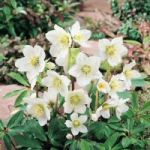| Common Name: |
Christe Herbe |
| Other Names: |
Black Hellebore, Christmas Rose |
| Botanical Name: |
Helleborus niger |
| Genus: |
Helleborus |
| Family: |
Ranunculaceae |
| Cultivation: |
Moist, rich, neutral to alkaline soil in partial shade. Thrives in heavy clay soils. |
| Propagation: |
By seed sown when ripe; by division after flowering or in late summer. |
| Harvest: |
Roots are collected in autumn for extraction of alkaloids. |
| Native Location: |
Austria, Germany, Switzerland, Italy, and Slovenia. |
| Height: |
15-30cm (6-12in) |
| Width: |
45cm (18in) |
| Variations: |
Potter's Wheel
Has large-centered flowers. |
| Hardiness: |
Z3 |
| Parts Used: |
Dried Rhizome, Roots |
| Properties: |
A bitter, acrid, purgative herb that stimulates the heart and uterus, and has anthelmintic and insecticidal effects. |
| Medicinal Uses: |
Formerly used internally for nervous and mental disorders, dropsy, amenorrhea, and intestinal parasites; externally to destroy lice. Used internally, in the form of alkaloids, to treat heart conditions in the elderly. For use by professional practitioners only. Excess causes abortion in pregnant wormen and may prove fatal.
To treat nausea, worm infestation, constipation, irregular menstruation, and head colds. |
| Typical Dose: |
A typical dose of black hellebore may range from 0.2 to 1.0gm per day. |
| Possible Side Effects: |
Black hellebore's side effects include poisoning, symptoms of which include a scratchy feeling in the mouth and throat, shortness of breath, nausea, vomiting, possible spasm, and asphyxiation. Black hellebore contains cardiac glycosides, which can help control irregular heartbeat, reduce the backup of blood and fluid in the body, and increase blood flow through the kidneys, helping to excrete sodium and relieve swelling in body tissues. However, a buildup of cardiac glycosides can occur, especially when the herb is combined with certain medications or other herbs that contain cardiac glycosides, causing arrhythmias, abnormally slow heartbeat, heart failure, and even death. |
| Drug Interactions: |
| Taking black hellebore with this drug may increase the risk of cardiac glycoside toxicity: |
| Digitalis, (Digitek, Lanoxin) |
|
| Disease Affects: |
Can worsen gastrointestinal inflammation. |
| Supplement Interactions: |
|
| Warning: |
All parts are extremely toxic if eaten. Prolonged handling may cause systemic poisoning. |
| Bibliography: |
Encyclopedia of Herbs by Deni Brown. Copyright © 1995, 2001 Dorling Kindersley Limited. pg 233
The Essential Herb-Drug-Vitamin Interaction Guide by Geo. T. Grossberg,MD and Barry Fox,PhD Copyright©2007 Barry Fox,PhD. Pp.78-79 |
